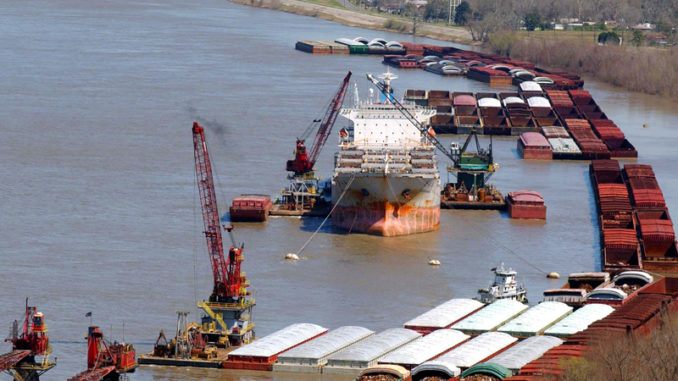
Aucoin: Deeper water translates into more work and jobs at ports
Paul Aucoin is straight to point about the implications of dredging the mouth of Mississippi River when he says, “It’s all about the jobs.”
The more than $200 million project aimed at deepening the river’s mouth at the Gulf of Mexico to 50 feet has gotten a sign off by the U.S. Army Corps of Engineers, bringing it much closer to reality.
As director of the Port of South Louisiana, Aucoin isn’t just sold on its necessity – he’s been pushing for it for years. And now he’s confident it’s coming with endorsements and approvals including the Corps and Louisiana Gov. John Bel Edwards.
“The ball is in the state of Louisiana’s court,” he said. “The remaining approval is the state share of the project.”
Aucoin estimated it could be $100 million or more. Dredging would cost about $40 million and then pipeline owners will hopefully assist in the cost of relocating pipelines. He projects the cost likely coming from the Harbor Maintenance Trust fund, estimated to have $9 billion from a tax collected on imported cargo.
“The mouth of the river has been authorized to be dredged to 55 feet, but it has to be 50 feet all day every day, not once in a while,” he said.
More than 50-foot deep access translates into hefty dollars for all the ports on this route to Baton Rouge.
The Port of South Louisiana operates on a 54-mile stretch of the river in St. Charles, St. John the Baptist and St. James parishes.
By tonnage moved, it is the nation’s largest port that employs 20,014 people. [pullquote]“The ball is in the state of Louisiana’s court. The remaining approval is the state share of the project.” – Paul Aucoin[/pullquote]
Vessels that enter Louisiana’s ports enter the mouth of the river, but when the water is below 50 feet deep they have to wait until the water rises to that level to deliver the goods. Aucoin estimated it could mean $25,000 a day in added delivery costs.
He recounted an example of a vessel waiting 42 days for the water to rise.
“Most choose to wait it out because they don’t know how long” before it happens, Aucoin said.
Shippers can also respond to the limit with vessels being “light loaded” or hauling less goods, but he added that makes goods more expensive by spreading cost over fewer items.
For St. Charles Parish, the port represents a conduit last year in foreign and domestic goods handled, including 6.5 million short tons of animal feed, 5.9 short tons of chemicals and fertilizers, 24.6 short tons of crude oil, 21.7 million short tons of petrochemicals, 17.3 million short tons of soybeans, and 8 million short tons of corn.

Be the first to comment